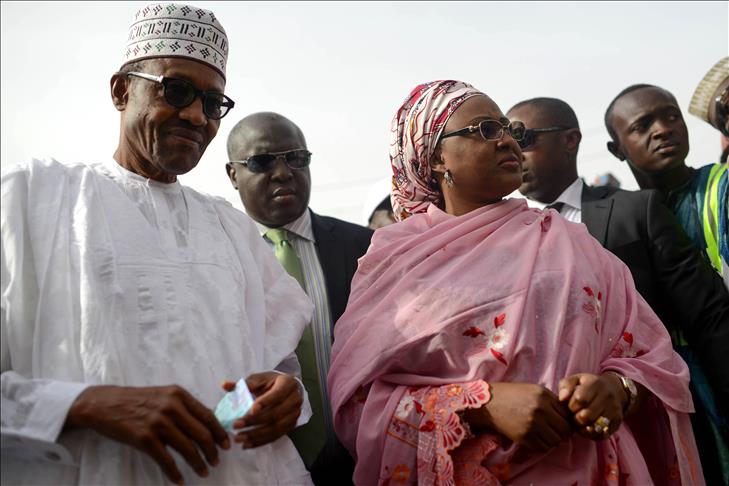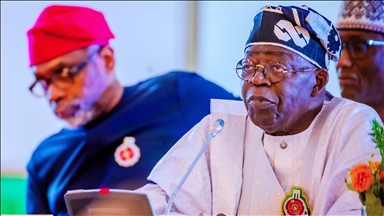
By Rafiu Ajakaye
LAGOS
Neither Nigeria's constitution nor law recognize the office of first lady. In practical terms, however, few positions in the country's political landscape come with the sort of influence and power enjoyed by the wife of the president.
So influential were many of Nigeria's first ladies over the years that – for good or ill – they often shaped the presidency itself.
Outgoing First Lady Patience Jonathan, for example, was very powerful, influential and controversial.
She was known for her enormous political powers and her willingness to cow her political enemies.
At the peak of her power, Patience was allegedly influencing government contracts and the party's electoral candidates – allegations she denies.
In February, the opposition All Progressive Congress (APC), of now President-elect Muhammadu Buhari, threatened to drag the first lady to court for allegedly asking the public to stone anyone caught shouting "change" – the APC's slogan.
Patience was also accused of using ethnic slurs against northern Nigerians, with critics quoting her as having said that northerners breed too many children.
The first lady was also known for the amusing way she expressed herself.
Nigerian standup comics outdo one another mimicking Patience's rib-cracking way of speaking and her infamous catch-phrases, like "there's God o" – which she said at the height of last year's controversy over the abduction of scores of schoolgirls by Boko Haram militants.
Her phrase "na only you waka come" – meaning "Did you come alone?" – has also become national slang, used in both the country's north and south.
"Patience will be missed for her comic relief," Abiodun Aremu, a public affairs commentator, told The Anadolu Agency.
"But I must say it is good riddance, because she wielded too much power," Aremu contended. "She was too controversial and power drunk."
Patience succeeded the equally controversial First Lady Turai, wife of late President Umaru Musa Yar'Adua.
Turai was hardly heard of from the time her husband took office in 2007 until he died in office in 2010 – though her purported actions were felt across Nigeria's political firmament.
When Yar'Adua fell ill in 2009 and remained out of public view for several months, Turai was accused of trying to assume his power at the expense of then Vice President Goodluck Jonathan.
Unlike Patience, however, Turai – who was hardly ever quoted in the media – was never overtly rude about her authority.
Change
As President-elect Buhari prepares to assume office on May 29, Nigerians are keen to see how the incoming first lady, Aisha Buhari, will complement her husband, who has promised Nigerians "change."
Born February 17, 1971, Aisha is the second wife of the president-elect, with whom she has five children, including four daughters.
The couple got married in 1989, according to her public profile.
She hails from Nigeria's northeastern Adamawa State from the prominent family of Muhammadu Ribadu, Nigeria's first indigenous defense minister, who served in the 1960s.
A professional beautician, entrepreneur and skills acquisition consultant, Aisha holds a Bachelor's Degree in Public Administration from Ahmadu Bello University in northwestern Kaduna state.
She is also an alumnus of the Carlton Institute of London and the Academy Esthetique Beauty Institute of France, where she obtained a post-graduate diploma in cosmetology and beauty therapy.
Soft-spoken but eloquent, Aisha is expected to bring her persona to the office of first lady, but it is not yet known what these will be.
If Buhari's trademark personal discipline and ascetic lifestyle are maintained in his presidency, Nigeria may see a rather low-key first lady who may not be heard of as often as Mrs. Jonathan had been.
Indeed, very little was known of the new first lady until late in the 2015 presidential campaign, when Buhari was pressed to let her make campaign appearances.
Jonathan's ruling party had jeered Buhari, saying he didn't believe in political rights for women and pointing to the fact that he was not giving his wife any role in the campaign.
Aisha had made some low-key campaign appearances for Buhari.
Even then, Aisha's comments were relatively measured and she seldom made headlines.
"Throughout the campaign, the first lady has carried herself with unusually dignified poise that doesn't match the fanfare we witnessed with the last two firsts ladies," Olamide Dauda, a management consultant and public affairs commentator, told AA.
"I was surprised when she rightly identified the limitary constraints of flaunting an office, which our constitution has not established, demonstrating her understanding of the framework," she said.
"She reminds me a lot of First Lady Maryam Babangida," added Dauda.
Late Maryam was the wife of former Nigerian military President Ibrahim Babangida, who ruled from 1985 to 1993.
She was the first Nigerian first lady to initiate projects that targeted grassroots development and poverty alleviation.
Many Nigerians still remember the glamour, charisma and poise Maryam brought to the office. Others, however, despised her power, influence and flamboyance.
Empowered
Dauda, the management consultant, would like to see the office of first lady given legal recognition – but with clear-cut roles and limitations to prevent excesses.
"I look forward to a first lady who will champion issues of importance relating to education, healthcare and increased participation of women in politics," she told AA.
"She will operate within the constitutionally appointed bodies to champion these causes, thereby also setting an example for her counterpart first ladies at the state level," said Dauda.
Kemi Okenyodo, executive director of the CLEEN Foundation, an NGO devoted to promoting public safety, security and accessible justice, agrees.
"There is a need to appreciate the fact that the office of the first lady is not a constitutional role, neither is it an extension of the executive arm of government," she told AA.
"I would like to see Hajia Aisha Buhari portray a positive image of the Nigerian woman – strength of character, resourcefulness and support," said Okenyodo.
"She should be involved in social activism – sensitization, awareness of social issues that cut across the country," she added.
"Issues," Okenyodo said, "that will resonate across north-south religious and ethnic divides that can become a platform for cohesive existence."
Anadolu Agency website contains only a portion of the news stories offered to subscribers in the AA News Broadcasting System (HAS), and in summarized form. Please contact us for subscription options.






